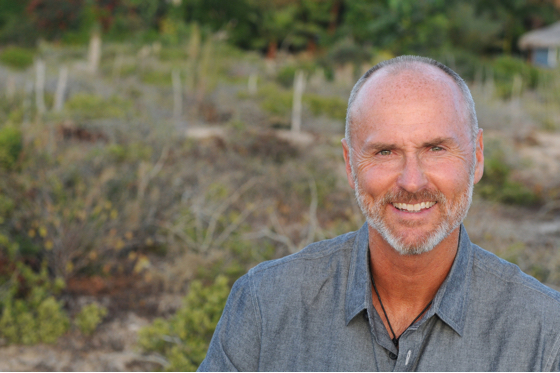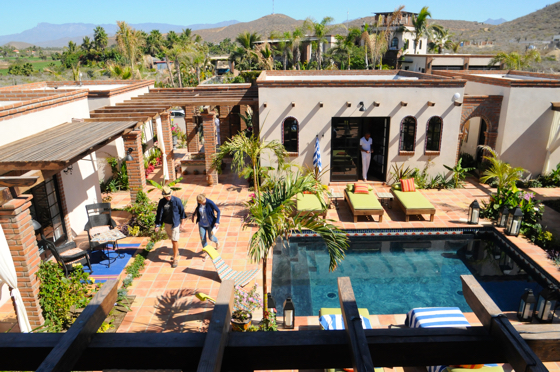If you are looking for something different, leave it to Chip Conley, who has made a career out of think outside the box – first with the edgy Joie de Vivre hotel brand founded in the late ‘80s in San Francisco and sold in 2010 to developer John Pritzker; then joining Airbnb to help give it a hotel-like aesthetic (he’s still a strategic advisor); and now with the new Modern Elder Academy that combines wellness with mid-life reinvention programming.
Conley’s first academy is selling out one- and two-week programs at the first “campus” in Baja California, Mexico, and he is working with a developer to transform a boutique hotel with available surrounding land somewhere in California. He wants to further grow the concept, which generally includes a community learning center, a farming component, spa and wellness, F&B, and more. What makes it an even more interesting proposition is a plan to include a real estate component to the developments. “I think transformational travel is going to be a long-term trend and a new form of hospitality real estate,” Conley recently told HOTELS.
Here is a Q&A with Conley, taking a closer look at his idea and why he thinks it is coming along at the right time.
HOTELS: Why did you create the Modern Elder Academy?
Chip Conley: First off, when I moved from a full-time to an advisor role, it gave me the time to write “Wisdom@Work: The Making of a Modern Elder” that launches later this month. This book helped me to articulate my experience of being the “modern elder” amongst the Millennials at Airbnb while being CEO Brian Chesky’s mentor. Also, with transformational travel being one of the biggest trends in travel, the idea is that people use their travel as a way of helping to transform themselves. Either in terms of internal work or seeing the world through a new pair of glasses, the Academy is intended to be something that can transform their perspectives on life. The idea is that people in mid-life would use their travel time to go and do a deep dive into repurposing themselves.
The fact that we’re going to live longer and that power is moving younger makes it a really difficult time for people in mid-life because it creates this irrelevancy gap of an additional 20 years. You’re going to live 10 years longer, but power’s moving 10 years younger. So now you’re irrelevant for 20 additional years.
The Academy is more than a retreat center, though, because we have a curriculum. We’re not just a facility, we’re also a facilitator. It has an educational component that we are actually developing ourselves.

HOTELS: How much potential does this concept have?
CC: I could see it being part of a bigger play where a Marriott, for example, says, ‘Okay, we’re going to work with you [a developer]. It’s a new real estate development in Arizona or Florida or somewhere in the Caribbean and you’re going to have a spa resort there. You’re going to have high-end luxury products there. You’ll have a St. Regis there, and then you’re going to have this intense program that’s smaller but very lucrative.’
The footprint is smaller because it’s not going to be 100 rooms – it’s going to be 40 rooms or less, and the people who come there are paying top dollar and they’re staying for seven days, or even two weeks. We have two-week long programs at the Academy, as well. They’re paying US$5,000 or US$10,000 a week [the first academy is a social enterprise so 50% of guests are on some form of scholarship].
It’s on brand with the idea that many of these hotel companies are trying to become lifestyle companies. Lifelong learning is not a fad; it’s a long-term trend and yet I don’t think the global hotel chains have come anywhere close to fully embracing how they would incorporate that into their brands.
HOTELS: What have you learned from your first Academy?
CC: What we’ve seen in over 150 people who went through our beta programs during the first half of this year is, far and away, the number one request is they wanted an alumni association so that they can continue to connect with each other. Many of these cohorts now do weekly calls and they stay in touch with each other, creating a safety net to talk about what they want to change in their lives, and these folks are helping them with that. What’s beautiful is the diversity as this is social workers as well as investment bankers who learn from each other from all over the world.
But the other thing they asked is about how to buy into this lifestyle. How could we create a wisdom community? What kind of community is that? Is that the same thing as a senior community? The answer to the last question is ‘no.’ The idea is instead of having a golf course that’s like the spine of the real estate community, the wisdom community would have a series of homes with a lot of communal areas, a farm and garden so people are living in proximity to agriculture that will actually be harvested and given to them at night. The wisdom center is basically a clubhouse that does programming that helps people figure out exactly what the Academy does. How do I want to repurpose myself? There will be a painting studio, a movement studio, a place where people get curious again facilitated by guest faculty. And, of course, we’ll have a fitness center and lap pool.
It’s not exclusively for people of a certain age, but it is for people who actually see that they want to have at the core of their lifestyle experience and where they live, either part-time or full-time, something that actually starts to cultivate and harvest their wisdom.

H: What are the plans to build residential at the first location in Baja?
CC: The residential is not built yet, but we’ve made offers on the land. We’ve got 14 acres of land that would make up the residential component. Then the academy component is about three acres on the beach.
H: Can you elaborate on the potential of the real estate play?
CC: You can do it in an area where you don’t mind having an agricultural flavor. You’re talking about buying agricultural land, with entitlements, and upgrading it up to residential. So there’s a huge value improvement just in that. The big piece here is that it actually has a combination of residential and “extended stay” together… The challenge with some residential communities is that they’re feast or famine, everybody’s there during the holidays, and a lot of these places are sort of deserted the rest of the time… What’s interesting here is we’re creating demand by actually creating the extended stay component for someone who’s going to come stay for four months or four weeks. We could have a property management company help rent these places out to those people who want to be in the wisdom community to do their sabbatical or their gap year. So the person who says, ‘Ok, I’m building this home, I love it, I’m down there five or six weeks a year, but the rest of the time I just have the management company renting it out. We cultivate the demand by actually having the Academy.
H: What is the take-away for the hotel development community?
CC: The question is how does the hospitality industry create a product that actually addresses the mid-life transition. The number one thing I’ve learned from this is that while the education piece is paramount, the thing that they really appreciate the most is the sense of social connection. It’s almost like going to summer camp and guests have a level of connection that they create due to the vulnerability that the program fosters and gives people a renewed sense of purpose.

